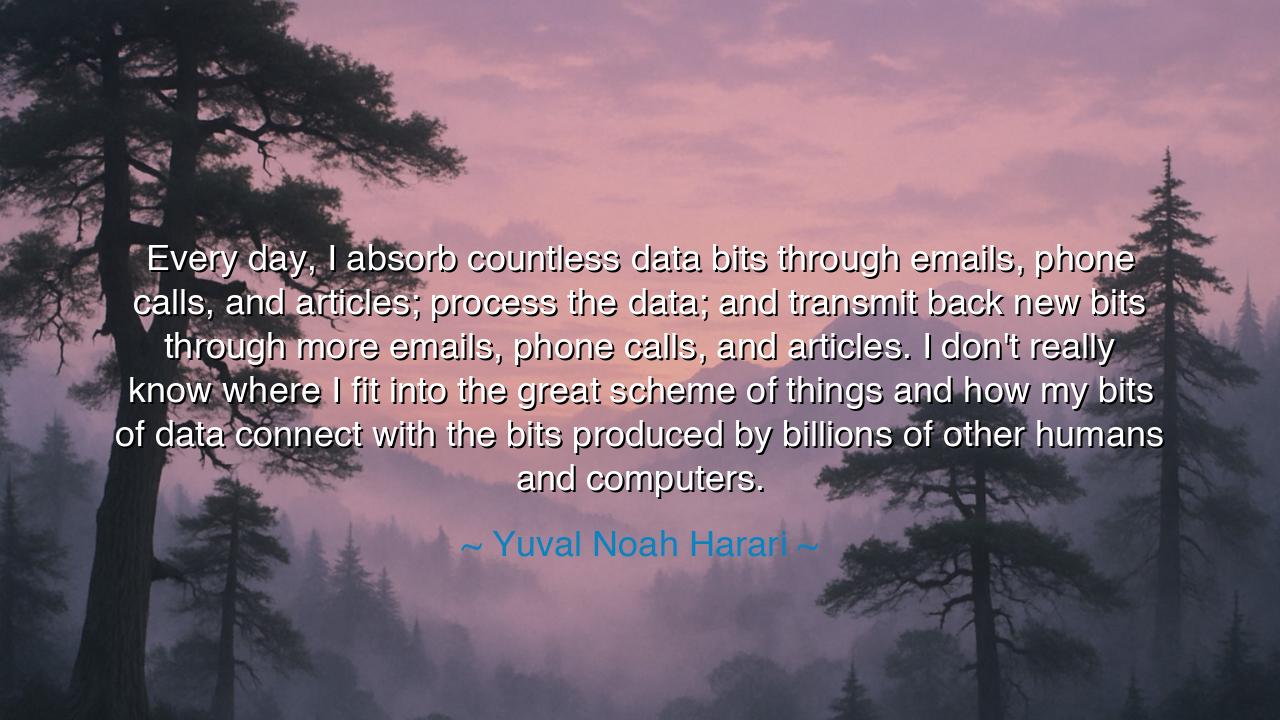
Every day, I absorb countless data bits through emails, phone
Every day, I absorb countless data bits through emails, phone calls, and articles; process the data; and transmit back new bits through more emails, phone calls, and articles. I don't really know where I fit into the great scheme of things and how my bits of data connect with the bits produced by billions of other humans and computers.






Listen, O children of the earth, to the words of Yuval Noah Harari, who speaks of the modern age, where every moment is consumed by the constant flow of data: "Every day, I absorb countless data bits through emails, phone calls, and articles; process the data; and transmit back new bits through more emails, phone calls, and articles. I don't really know where I fit into the great scheme of things and how my bits of data connect with the bits produced by billions of other humans and computers." These words carry the weight of the modern human condition, a world where we are constantly connected, constantly sharing, yet often left wondering about our true place in this vast web of information.
In ancient times, the people lived connected to the earth, to their communities, and to the cycles of nature. The rhythms of life were governed by the seasons, the sun, and the moon—elements that were ever-present, ever-understood. In those days, a person's role in the grand scheme of things was clearer, simpler—to till the soil, to build the village, to protect the people. Yet, as Harari’s words suggest, in this age of data and technology, our place in the world feels more fragmented. We are consumers and producers of information, but what does it all mean? How do we connect the thousands of digital threads we create each day? And in this vast, overwhelming current of data, how do we find our true purpose?
Consider the story of the ancient seer, who, with a deep understanding of the natural world, could read the stars and the elements to predict the future. The seer did not need the constant noise of data bits to understand their role in the universe. Their wisdom came from observing the cycles of nature, the ebb and flow of life, and their connection to something greater than themselves. Harari, in his reflection, speaks of the disconnection we feel in our modern world. We are like those ancient seers, yet instead of reading the stars, we are overwhelmed by endless streams of data, and instead of understanding our place, we are caught in the current, unsure of our direction.
The rise of technology has made us more connected than ever before, yet Harari’s words remind us of the paradox of modern life. We live in a world where we can communicate with anyone, anywhere, yet we may still feel profoundly alone, adrift in a sea of information. The constant flow of data through emails, phone calls, and articles, though vital to our work and progress, can also serve as a form of distraction, pulling us away from our deeper purpose. In the ancient world, a person’s contribution to society was clear—whether it was through their labor, their art, or their wisdom. But in today’s world, where each action seems to be followed by an equal and opposite reaction in the form of another message, another notification, another task, we may wonder: What is the greater meaning of it all?
Let us consider the story of the great philosopher Socrates, who famously claimed that the unexamined life is not worth living. Socrates lived in an age where knowledge was shared orally, passed down from master to student, from teacher to disciple. Yet, in the simplicity of his world, Socrates sought to understand his place within it—not through overloading himself with data, but through self-reflection and dialogue. Today, we too must ask ourselves: How do we filter through the noise? How do we ensure that the data we absorb truly leads us to wisdom, rather than confusion? In an age where information is so readily available, Harari’s insight challenges us to seek not just more information, but meaning, purpose, and connection in the vast sea of data that surrounds us.
The lesson here, O children of the earth, is one of mindfulness and purpose. In our modern lives, where we are constantly bombarded with information, we must learn to filter the noise and focus on what truly matters. The flow of data is unavoidable, but how we engage with it determines our role in the world. We must ask ourselves: Are we simply absorbing and transmitting information, or are we truly creating meaning through our actions and thoughts? Just as the ancient seer understood the movements of nature, we too must understand the currents of the digital age, not as forces that carry us aimlessly, but as tools we can use with wisdom.
In your own life, O seekers of wisdom, remember that the value of data lies not in its abundance, but in its purpose. Take time to reflect on how the data you consume and produce fits into the greater story of your life. Do not let the constant flow of information cloud your understanding of who you are and why you are here. Strive to connect with the world not only through technology, but also through your heart, your mind, and your purpose. In this way, you will transform the bits of data into something far greater—wisdom, understanding, and meaningful connection.






AAdministratorAdministrator
Welcome, honored guests. Please leave a comment, we will respond soon